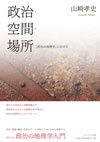Introducing Takashi Yamazaki
 Takashi Yamazaki is Professor of Geography at Osaka City University in Japan. Moreover, he is a steering committee member of the Commission of Political Geography (International Geographical Union), and co-chair of Research Committee 15 (Political and Cultural Geography, International Political Science Association).
Takashi Yamazaki is Professor of Geography at Osaka City University in Japan. Moreover, he is a steering committee member of the Commission of Political Geography (International Geographical Union), and co-chair of Research Committee 15 (Political and Cultural Geography, International Political Science Association).
Professor Yamazaki obtained a PhD in Geography (University of Colorado) in 2004, and a BA and an MA in Geography (Kyoto University) in the 1980s.
Geopolitical Passport
Your relationship with geopolitics
At what age did you discover geopolitics and what attracted you to it?
When I was an undergrad in the 1980s, I was not interested in (classical) geopolitics because it was stigmatized as a problematic (e.g. militaristic) system of knowledge at that time. However, when I was in my thirties (in the 1990s), I read Peter Taylor’s Political Geography (Longman, 1989) and Gerard Toal’s Critical Geopolitics (University of Minnesota Press, 1996). Then I began to realize that geopolitical perspectives could provide me with a useful and critical insight into military campaign, foreign diplomacy, and even local politics in an era of globalization.
In post-war Japan, geopolitics, and political geography in general, have long been excluded from the subjects of geography due mainly to its relation to war aggression and ultra-nationalism. This association has ultimately contributed to limiting the scope of Japanese geographers to domestic or local issues.
After the demise of the Soviet Union, however, it became difficult to understand Japanese foreign /domestic policies and economic growth/decline without considering Japan’s geopolitical location and context. So I realized that geography in Japan needed to change to include the perspectives of geopolitics and political geography, which led to my decision to go to the US for my PhD.
Which geopolitical topics have your focus and why did you choose especially these?
When I decided to go to the US, I wanted to explore political geographical topics somehow related to Japan-US relations. After World War II, Japan became dependent on US military presence within Japan as nuclear deterrence. This was the core arrangement of the Japan-US alliance under the Cold War, and its significance has been repeatedly redefined according to new geopolitical contexts in the west Pacific.
Although this alliance has been maintained for the security of Japan as a whole, the actual geographical distribution of US military installations has been highly uneven; 74% of (the area of) them are concentrated in one prefecture, Okinawa. Okinawa was once an independent kingdom and annexed to Japan in 1879.
As socio-economically marginalized by Japan proper, it became a tragic battle ground in 1945 and was put under the US military administration until 1972 when it reverted to Japan. Even after reversion, however, there are still more than thirty US military installations left in Okinawa.
Ever since I went to the US, I have been looking at how Okinawans have protested against the continuing militarization of their islands according to the shifting geopolitical context of Okinawa.
What do you consider your most important contribution to geopolitics?
 I do not think that my works have ever contributed to geopolitics as a system of knowledge but feel that my works have somehow stimulated young Japanese geographers by making them believe that it is OK to think about geopolitics in geography.
I do not think that my works have ever contributed to geopolitics as a system of knowledge but feel that my works have somehow stimulated young Japanese geographers by making them believe that it is OK to think about geopolitics in geography.
For this purpose, I have just published a text book on geopolitics and political geography in Japan. I hope that the book will have some positive impact on Japanese geographers’ perception of geopolitics. The book is titled “Seiji, Kukan, Basho” [Space, Place, and Politics]. It is the very first political geography textbook written by a single author in post-war Japan.
My geopolitical preferences
What is your favourite definition of geopolitics?
In the aforementioned book, I define classical geopolitics as “a system of knowledge or discipline that according to the deterministic understanding of the geographical locations of states and the geographical conditions surrounding them, analyzes political relations between great powers, particularly diplomacies including military confrontation, and attempts to apply the analysis to military and foreign policies.”
This traditional definition points to two major components of classical geopolitics as statecraft: environmental determinism and policy application. Critical geopolitics adds to this a new dimension of ‘geopolitics as discourse.’
I would like to extend these definitions to include multi-scalar aspects of geopolitics because politics towards land or geography (i.e. geo-politics) is not limited to statecraft. In an era of globalization, geopolitics can be seen at various geographical scales. So I think that a better definition of geopolitics consists of components such as environmental determinism, policy application, discourse, and multi-scale.
Which geopolitical scientist do you admire the most?
I would like to name political geographers and scientists rather than geopolitical scientists because I do not necessarily ‘admire’ geopolitical scientists as scientists; they tend to be ideologists and too state-centric.
Theoretically, scholars such as John Agnew, Peter Taylor, John O’Loughlin, Gerard Toal, Stain Rokkan, and Cynthia Enloe are influential on me. Agnew, Taylor, O’Loughlin, and Toal are founders of so-called ‘New Geopolitics’ and have opened new frontiers of geopolitical studies.
Rokkan’s model of center-periphery relations constitutes a theoretical basis of my works on Okinawa. Feminist scholars such as Enloe provide me with a new insight into the gendered militarization of Okinawa.
In Japan, most geopolitical scientists are realists or classical and not so influential on me.
What is your favourite geopolitical book?
For reference, I often use “Dictionary of Geopolitics” (edited by O’Loughlin) and “The Geopolitics Reader” (edited by Toal et al.). These give me very good guidance in understanding the history of geopolitics and geopolitical texts and discourses.Toal’s “Critical Geopolitics” has broadened my perspective of geopolitics in a more critical direction.
As mentioned above, I have often cited Rokkan and Derek Urwin’s “Economy, Territory, and Identity” as one of the theoretical frameworks for my research on Okinawa. Other than these, I really enjoyed reading Peter Taylor’s “The Way the Modern World Works” because this book succeeds in extending the notion of world politics into cultural hegemony.
My colleagues and I now plan to translate into Japanese Colin Flint’s “Introduction to Geopolitics”. We believe that this translation will promote a ‘sober’ understanding of geopolitics among Japanese readers.
What is your favourite geopolitical website?
I run my own Japanese website called “Seiji-chiri no peji”: Website of Political Geography (in Japanese)
The website contains power point slides and course materials for my lectures and seminars and downloadable files of my publications on political geography and geopolitics. It seems to attract attention from Japanese university students and geographers.
There are some popular geopolitical websites run in Japanese, but generally their contents are biased from an academic point of view. My major sources of geopolitical information are websites of major newspapers and governmental organizations.
It is a shame that I had not known ExploringGeopolitics and the Geopolitical Passport series before I was interviewed. I will try to visit this website more often.
The geopolitical future
In what direction(s) will geopolitical science be heading the coming decades?
I predict that in Japan as well as the rest of the world classical or realist geopolitics will gain popularity in the public and revive in the academic circle as people and politicians become insecure and anxious about the future of their nation-states.
This tendency has become apparent in Japan since the late 1990s when North Korea and China began to be perceived as new security threats to Japan. September 11 and Japan’s subsequent involvement in US-led military campaigns in Central and West Asia have also promoted public sentiments in favour of more active foreign and security policies.
Japan’s long-term economic recession and political turmoil in the national government have further contributed to deepening the popular sense of ‘state crises’ In addition, territorial disputes that had been politically silenced are being revived against China, South Korea, and Russia.
Under such circumstances, I am sure that popular and academic demands for classical or realist geopolitics will grow for the coming years.
Which geopolitical subject has been too little in the spotlight and needs further research?
As Toal argues, classical geopolitics constitutes discourses about world politics that simplify and dichotomize inter-state relations and appear to chart the future of a nation-state. This aspect of geopolitical discourse attracts popular attention and tends to stimulate aggressive foreign policy.
Given that geopolitics and political geography once lost their critical gaze against war aggression, academics related to these disciplines should highlight how states wage a war, how people support it, and what kind of outcome will follow.
Moreover, the contemporary world faces crises of non-conventional military conflicts that classical geopolitics cannot necessarily comprehend. In this sense, geopolitics based on classical theories of inter-states conflicts tends to lose the power of explanation.
Beyond political discourses by powerful politicians and arm-chair political analysts, political geography needs to expose the material bases of political conflicts and represent silenced voices of the oppressed in the conflicts through empirical research and fieldwork.
In this sense, I argue that geopolitics and political geography with a critical gaze need to become important subjects to understand how the modern world works rather than stimulate nationalistic sentiments among the younger generation.
What will be the largest geopolitical challenge for the world in the 21st century?
As mentioned above, the largest geopolitical challenge for the world is now if we can understand how the contemporary world works using classical geopolitical theories formulated in the first half of the 20th century. Classical geopolitics tends to think that the geographical locations of states significantly influence their foreign policies, that such physical locations continue to be the same for a long period of time, and therefore that the geographies of states can continue to determine their politics.
Scholars in geopolitics and political geography, however, really need to scrutinize the shifting nature of violent political conflicts and ask themselves if they can explain them with existing geopolitical theories and if these theories limit our ability to understand them.
As Peter Taylor argues in the 1990s, while traditional concepts such as nation, state, sovereignty, and territory are based on a singular model of the nation-state, the actual world is comprised of the dynamic and interwoven web of multiple nations, states, sovereignties, and territories. We need to reexamine and re-conceptualize these concepts so as to better approach the more complex geopolitical reality of the contemporary world.
